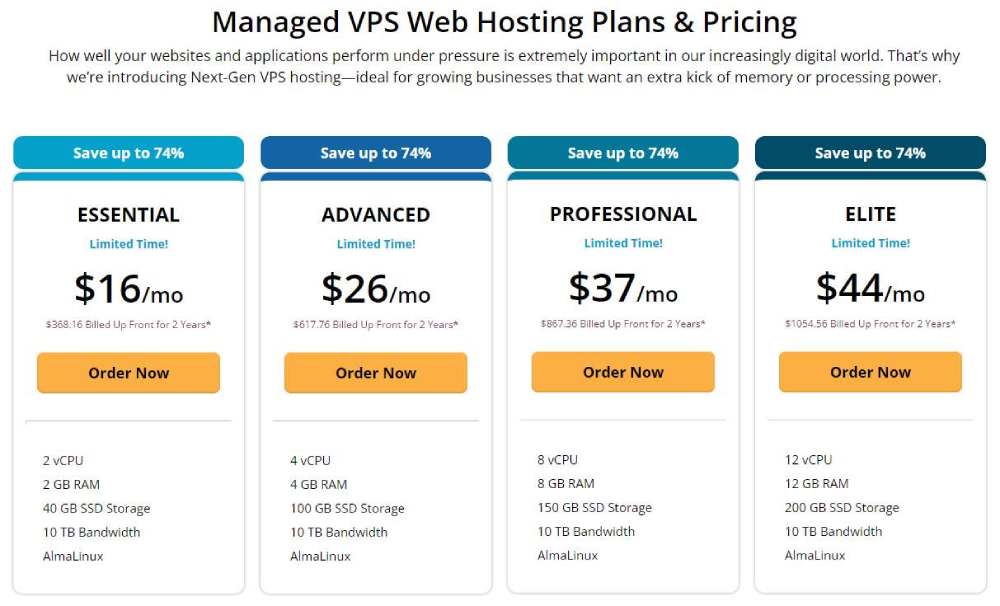
VPS Hosting vs Cloud Hosting: Comparing Features, Price & Benefits
Did you know that 90% of businesses will move to the cloud by 2024? When it comes to hosting your website, choosing between VPS hosting and cloud hosting, both available options in the internet server environment, can be a tough decision.
Understanding the differences between these two options VPS Hosting vs Cloud Hosting is crucial for making an informed choice that aligns with your website’s needs.
VPS hosting offers dedicated resources on a virtual server, ideal for websites with consistent traffic. On the other hand, cloud hosting provides scalability, flexibility, and support by utilizing multiple interconnected servers and configurations.
By comparing factors like performance, scalability, pricing, and reliability, you can determine which hosting solution best suits your requirements.
- VPS Hosting vs Cloud Hosting (Key Takeaways)
- Overview of Cloud Hosting
- Benefits of Cloud Hosting
- Overview of VPS Hosting
- Benefits of VPS Hosting
- Comparing Features and Performance
- Scalability and Flexibility Differences
- Pricing Models and Cost Effectiveness
- Choosing Based on Website Needs
- Trends in Hosting Solutions
- Frequently Asked Questions
- Closing Thoughts
VPS Hosting vs Cloud Hosting (Key Takeaways)
- Consider Your Website Needs: Evaluate your website’s requirements in terms of performance, scalability, and flexibility to determine whether VPS hosting or cloud hosting is the better fit for your virtual server.
- Prioritize Scalability: If your website needs to handle fluctuating traffic levels and demands scalability, cloud hosting might be the more suitable option due to its ability to scale resources on-demand.
- While VPS hosting may offer cost savings for predictable workloads, cloud hosting’s pay-as-you-go model can be more cost-effective for variable workloads and rapid growth scenarios, supporting web developers who need hardware.
- Stay Informed on Hosting Trends: Keep abreast of the latest trends in hosting solutions to leverage emerging technologies and stay competitive in the online landscape.
- Analyze Performance Features: Compare the specific features and performance metrics of VPS hosting and cloud hosting to align them with your website’s requirements for optimal functionality.
- Adapt as Your Website Grows: Be prepared to adjust your hosting solution as your website evolves, ensuring that it can accommodate increasing traffic and changing needs effectively.
Overview of Cloud Hosting
Virtualization Technology
Cloud hosting leverages virtualization technology to allocate resources efficiently across multiple servers, ensuring optimal performance and reliability.

This technology enables the creation of virtual servers within a physical server, allowing for seamless resource distribution.
Utilizing virtualization technology, cloud hosting providers can dynamically allocate resources such as CPU, RAM, and storage based on the website’s requirements.
This flexibility ensures that websites hosted on cloud servers experience minimal downtime and consistent performance.
Scalability Advantage
One key aspect that sets cloud hosting apart is its scalability. Websites hosted on cloud servers can easily scale up or down based on traffic fluctuations.
This means that during peak times, additional resources can be allocated instantly to handle increased traffic without affecting performance.
The ability to scale resources on-demand makes cloud hosting an ideal choice for websites with unpredictable traffic patterns or those experiencing rapid growth.
Businesses can effortlessly adjust their hosting resources to match their needs, ensuring optimal performance at all times.
Accessibility Benefits
Websites hosted on cloud servers enjoy enhanced accessibility due to the distributed nature of cloud infrastructure.
With data stored across multiple servers in various locations, users can access the website from any location with minimal latency.
Moreover, the redundancy built into cloud hosting ensures high availability and reliability. In case of hardware failures or server issues, the website automatically switches to a backup server, minimizing downtime and ensuring continuous accessibility for users.
Benefits of Cloud Hosting
Scalability
Cloud hosting offers flexibility by allowing users to easily scale up or down resources based on demand. This means that businesses can quickly adjust their storage, bandwidth, and computing power without any downtime.

The ability to scale resources in cloud hosting is crucial for businesses experiencing fluctuating traffic levels. Instead of investing in fixed infrastructure, cloud hosting enables companies to adapt swiftly to changing needs, ensuring optimal performance at all times.
Reliability and Performance
One of the key advantages of cloud hosting is its reliability. With resources distributed across multiple servers, if one host server fails, the workload is automatically shifted to another server. This ensures that websites and applications remain operational with minimal disruptions.
Moreover, cloud hosting providers allocate equal resources to each user, enhancing performance consistency.
By leveraging a network of servers, cloud hosting delivers high availability and uptime, critical for businesses requiring uninterrupted service delivery.
Market Growth Projections
The future of cloud computing looks promising as market analysts project substantial growth in the coming years.
The global cloud computing market is anticipated to reach $832.1 billion by 2025, driven by increased adoption across various industries.
Businesses are increasingly migrating to cloud hosting solutions due to their cost-effectiveness, scalability, and enhanced security features.
As organizations embrace digital transformation initiatives, cloud hosting continues to play a pivotal role in supporting modern IT infrastructure.
Overview of VPS Hosting
Definition of VPS Hosting
VPS hosting involves dividing a physical server into multiple virtual servers, each operating independently. This setup offers users dedicated resources and control over their server environment.

Virtual servers, also known as VPS, are created using virtualization technology that partitions the main server into smaller virtual compartments.
Each virtual server functions as an independent entity with its own operating system, storage, and resources.

Control and Customization Benefits
With VPS hosting, users have greater control over their server environment compared to cloud hosting.
They can customize software configurations, install applications, and manage security settings based on their specific requirements.
The flexibility of virtual servers allows users to scale resources up or down based on traffic fluctuations.
This level of control is especially beneficial for businesses needing a reliable hosting solution that can adapt to changing needs.
Common Uses for Medium to High-Traffic Websites
VPS hosting is ideal for medium to high-traffic websites that require more resources than shared hosting can provide.
E-commerce sites, business portals, and content-heavy websites benefit from the dedicated resources and performance optimization offered by virtual servers.
Medium-sized businesses often choose VPS hosting for its reliability and security features. By having a separate virtual environment, they can ensure consistent performance even during peak traffic periods.
The customizable nature of VPS allows businesses to tailor their server setup to meet specific operational needs.
Benefits of VPS Hosting
Total Freedom
VPS hosting offers total freedom by allowing users to have full control over their virtual servers. This means they can customize software configurations and settings based on their specific needs.
Each VPS has its server resources, ensuring performance efficiency. By having dedicated resources, users can experience consistent speed and reliability without being affected by other websites’ activities on the same physical server.
Enhanced Security
One of the key benefits of VPS hosting is the security it provides. Since each VPS operates independently, any security breach or issue on one VPS does not impact others.
This isolation ensures better protection for data and applications hosted on the server.
VPS hosting is particularly suitable for online applications and databases that require reliable performance and security measures.
With guaranteed resources, businesses can run critical applications smoothly without worrying about sudden traffic spikes affecting their performance.
Comparing Features and Performance
Scalability
Cloud hosting offers greater scalability compared to VPS hosting due to its ability to instantly allocate resources based on demand. This flexibility allows businesses to easily adjust their resources according to traffic spikes or growth.
On the other hand, VPS hosting, while providing decent scalability options, may require manual intervention for upgrading resources. This can lead to downtime during resource upgrades and may not be as seamless as cloud hosting.
Performance Aspects

When it comes to performance, cloud hosting excels in providing high levels of reliability, thanks to its distributed nature across multiple servers. This setup ensures that if one server fails, others can seamlessly take over, minimizing downtime.
In contrast, VPS hosting, being more localized on a single physical server, may face downtime if the server experiences issues. However, VPS hosting still offers solid performance for smaller websites or applications with moderate traffic.
Pricing Differences
In terms of pricing, cloud hosting typically follows a pay-as-you-go model where users are charged based on their actual resource usage.
This can be cost-effective for businesses with fluctuating traffic patterns as they only pay for what they use.
On the other hand, VPS hosting usually involves fixed monthly costs based on the chosen plan’s configurations. While this can provide predictability in expenses, it may result in underutilization of resources for periods of low traffic.
- Cloud Hosting:
- Greater scalability
- Pay-as-you-go pricing model
- VPS Hosting:
- Manual intervention for resource upgrades
- Fixed monthly costs
Scalability and Flexibility Differences
Cloud Hosting Scalability
Cloud hosting offers high scalability due to its ability to adjust resources based on demand. Users can easily scale up or down their resources, such as storage, bandwidth, and processing power.
This flexibility allows for seamless expansion during peak times and cost savings during low traffic periods.
Cloud hosting services provide flexibility in scaling resources by offering a pay-as-you-go model. This means users only pay for the resources they use, making it a cost-effective solution for businesses with fluctuating resource needs.
Cloud hosting enables easy access to various services like databases, applications, and security features.
VPS Hosting Limitations
In contrast, VPS hosting has limited scalability compared to cloud hosting. Virtual Private Servers are confined to a fixed amount of resources allocated at the time of setup.
Scaling up resources in VPS hosting often requires manual intervention and downtime for resizing servers or upgrading plans.
The implications of limited scalability in VPS hosting can be significant for businesses experiencing sudden spikes in traffic or resource demands.
Without the ability to quickly scale resources like CPU, RAM, or storage, websites hosted on VPS servers may face performance issues or even downtime during peak periods.
Pricing Models and Cost Effectiveness
Fixed Monthly Fee
VPS hosting offers a cost-effective solution with a fixed monthly fee. Users pay a predetermined amount each month, allowing for better budgeting and financial planning.
This predictable pricing model is ideal for businesses with stable traffic and resource needs.
Comparison of Pricing Models
When comparing the pricing models of cloud hosting and VPS hosting, it’s essential to consider the differences. VPS hosting typically operates on a fixed monthly fee basis, while cloud hosting follows an on-demand billing model.
This means that users only pay for the resources they consume in cloud hosting, leading to potential cost fluctuations based on usage.
Potential Higher Costs
Cloud hosting’s on-demand billing model can result in potentially higher costs compared to VPS hosting.
While this model offers flexibility by charging users based on their resource consumption, it can lead to unpredictable expenses, especially during traffic spikes or unexpected resource usage. Businesses must carefully monitor their usage to avoid inflated bills.
Choosing Based on Website Needs
Factors to Consider
When deciding between VPS hosting and cloud hosting, it is crucial to assess specific website needs. Firstly, evaluate the hardware resources required by your site. VPS offers dedicated resources, while cloud hosting provides scalability.
Consider the scalability of your website. Cloud hosting allows for easy scaling of resources based on demand fluctuations. In contrast, VPS has fixed resources that could limit growth potential.
Matching Hosting Solutions
Match the hosting solution with your website’s traffic volume. For high-traffic sites, cloud hosting’s scalability ensures consistent performance during traffic spikes. On the other hand, VPS suits smaller websites with predictable traffic patterns.
Evaluate your budget constraints. VPS hosting often comes at a lower cost compared to cloud hosting, making it ideal for small businesses or startups with limited financial resources.
Specific Use Cases
For e-commerce websites, consider factors like security and uptime. Cloud hosting’s redundant infrastructure offers better uptime guarantees and data security measures compared to VPS hosting.
Websites focusing on content delivery may benefit from VPS hosting’s dedicated resources for improved loading speeds and overall performance.
Trends in Hosting Solutions
Evolving Technologies
Cloud hosting has gained popularity due to its scalability and flexibility, utilizing multiple servers to host websites.
On the other hand, VPS hosting offers a more stable environment by allocating dedicated resources within a single server.
While cloud hosting allows for seamless resource allocation across various servers, VPS hosting ensures consistent performance with allocated resources.
The choice between the two depends on the website’s specific needs and traffic fluctuations.
Future Prospects
In the future, hosting solutions are expected to become more streamlined and efficient. Cloud hosting is projected to dominate the market due to its ability to handle high traffic volumes and provide enhanced security measures.
Moreover, advancements in technology will lead to improved server environments, offering faster speeds and better reliability.
This will result in reduced downtime for websites, ensuring maximum uptime and user satisfaction.
Impact of Technological Advancements
Technological advancements have revolutionized the way websites are hosted, with cloud hosting leading the way in innovation.
By harnessing the power of virtualization and automation, hosting providers can offer cost-effective solutions with unparalleled scalability.
Improvements in data center infrastructure have led to increased efficiency in managing server environments, resulting in better performance and higher levels of security.
As a result, businesses can expect reliable hosting services that meet their evolving needs.
Frequently Asked Questions
What are the key differences between VPS hosting and cloud hosting?
VPS hosting provides dedicated resources within a virtual environment, suitable for stable workloads. On the other hand, cloud hosting offers scalability and flexibility by leveraging multiple servers. Choose VPS for consistent performance and cloud for dynamic needs.
How does pricing differ between VPS hosting and cloud hosting?
VPS hosting typically has fixed pricing based on allocated resources, making it predictable for budgeting. Cloud hosting operates on a pay-as-you-go model, allowing you to scale resources up or down as needed, potentially resulting in cost savings for variable workloads.
Which hosting solution is more suitable for small businesses with growing needs?
For small businesses experiencing growth, cloud hosting is often recommended due to its scalability features. With cloud hosting, you can easily adjust resources to accommodate increased website traffic or expand business operations without the need to migrate servers.
Can I switch from VPS hosting to cloud hosting seamlessly?
While both VPS and cloud hosting have distinct infrastructures, transitioning from VPS to cloud can be achieved smoothly with proper planning. Consult with your hosting provider to ensure a seamless migration process that minimizes downtime and potential disruptions to your online presence.
How do trends in hosting solutions impact the choice between VPS and cloud hosting?
As technology evolves, cloud hosting continues to gain popularity due to its agility and scalability benefits. Stay informed about emerging trends in the industry to make informed decisions when choosing between VPS and cloud hosting based on your website’s specific requirements.
Closing Thoughts
In the realm of hosting solutions, understanding the distinctions between VPS hosting and cloud hosting is crucial for optimizing your website’s performance.
By weighing the benefits, features, scalability, and pricing models outlined in this article, you can make an informed decision tailored to your specific needs.
Remember to prioritize flexibility, reliability, and cost-efficiency when selecting the ideal hosting option for your website.
As technology advances and online presence becomes increasingly vital, staying abreast of hosting trends and innovations will empower you to adapt proactively.
Whether you opt for the controlled environment of VPS hosting or the dynamic capabilities of cloud hosting, your choice should align with your website’s requirements and growth trajectory.
Take charge of your online presence by choosing a hosting solution that propels your website towards success.
